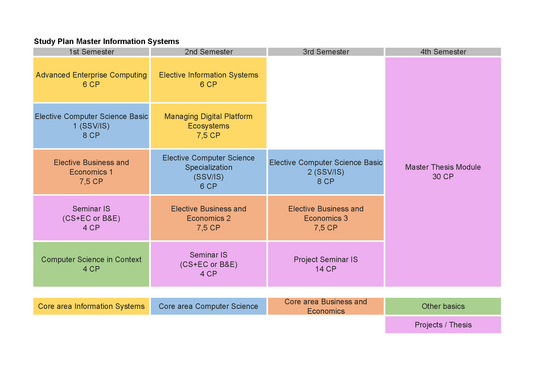Master's degree program in Information Systems
The Master's degree course in Information Systems provides advanced specialist knowledge of how business processes can be designed and challenges in companies solved with the help of computer science.
The Master's degree course in Information Systems is a full-time, on-campus course with a standard period of study of four semesters (two years) and results to a Master of Science (M.Sc.) degree. This can be followed by PhD at our department. To enrol on the Master's degree program in Information Systems, you must generally have a very good or good (grade 2.9 or better) relevant Bachelor's degree.
Directly to the application in the TU Dortmund University campus portal
Study Plan
Below you will find a study plan for the start of the winter semester with its various modules. Please note the deadlines for seminar applications for economics modules.

In courses offered by the departments of Business Administration and Economics and Computer Science, you will acquire knowledge of information systems, which, for example on the management of artificial intelligence and the management of digital ecosystems.
In the courses of the Department of Computer Science, you will learn the basic and specialized knowledge in several courses, which, for example, deepen aspects of intelligent systems and artificial intelligence or software, security and verification.
In the courses offered by the Department of Business and Economics, you will learn the basics and specialized knowledge of your choice from the porfolio of business and economics.
In addition, the course "Computer Science in Context" provides additional knowledge about applied aspects of computer science such as law or project management.
The curriculum above is an example. You can also customize your study plan. If you have any questions, please contact the Student Advisory Service at our department.
Frequently asked questions
The knowledge acquired in the Information Systems program not only enables you to optimize processes and solve real problems in companies.It also enables you to design innovative new products and services and associated business models.
Based on the basic knowledge of Information Systems acquired in the bachelor's degree program in data management, process management, and information management, as well as the fundamentals of business and economics, mathematics, and computer science, the master's degree program offers you flexible but coordinated specialization options. Through your studies, you will acquire knowledge in specialized topics related to
- the management of artificial intelligence and digital platform ecosystems.
Further, the master's degree program offers you elective courses in the fields of
- computer science in the research areas of artificial intelligence and intelligent systems and/or software, security, and verification, and
- business and economics,
- as well as other fundamentals, such as law or project management.
Another special feature of the master's program is that courses in business engineering, industrial information management, and cyber-physical systems can be taken at the Department of Mechanical Engineering. It is also possible to take courses from the University Alliance Ruhr as an elective module in Information Systems.
In addition, there are numerous elective courses in Information Systems, Computer Science, and Business and Economics to choose from. This range of subjects is supplemented by seminar-based and project-oriented modules in Information Systems.
Altogether, this offers you the ideal opportunity to acquire specialist knowledge in the field of artificial intelligence in courses on machine learning, which is a major focus of the program in Dortmund. In addition to the Department of Computer Science, groundbreaking research in this field is also being conducted at the Lamarr Institute for Machine Learning and Artificial Intelligence and the Research Center Trustworthy Data Science and Security, which also finds its way into research-oriented teaching in the Master's program in Information Systems.
The Master's program in Information Systems at TU Dortmund University bridges the gap between the programs offered by the Department of Computer Science and the Department of Business and Economics. Studying Computer Science with a minor in Business and Economics or Applied Computer Science with a minor in Enterprise Computing only provides a basic understanding of business processes, concepts, and methods with restricted access to business and economics modules.
Only the Information Systems degree program allows you not only to
- comprehensively specialize in core topics of Business and Economics,
- but also includes essential specializations in Computer Science, especially in the field of machine learning.
This program is supplemented by numerous Information Systems core courses in the form of lectures, projects, and seminars.
You will apply the knowledge gained in lectures not only in tutorials, but also in the project seminar, which is integrated into the curriculum. In the project seminar, you will spend one semester working in a group on your own project, for which you will have to analyze requirements, draw up a project plan, monitor your project progress yourself, and give a final presentation. In doing so, you will not only gain professional experience, but also acquire soft skills in teamwork, time management, and project management.
Studying Information Systems opens up career opportunities in various sectors of the economy, including technology companies that act as providers of digital technology, user companies that use digital solutions, consulting firms and public administration. Another perspective is self-employment as an entrepreneur in your own start-up. It is also possible to pursue a doctorate, which opens up further career opportunities in industry and academia. Exemplary professional fields include IT management, IT consulting, IT entrepreneurship, process management, data analysis, and artificial intelligence engineering. In view of the dynamic technological development, it is to be expected that new occupational fields will constantly emerge and existing occupational fields will change.
Example of IT consulting
IT consulting plays a key role, particularly in the planning, management, monitoring and implementation of larger projects for the digital transformation of organizations. IT consultants have in-depth business and technical expertise, on the basis of which they help their clients to master technological challenges and realize strategic competitive advantages. The tasks of IT consultants include analyzing the strategic and technical requirements of a company, recommending system improvements, planning and executing IT projects and supporting the implementation of new technologies. IT consultants often work in interdisciplinary project teams and must have strong communication skills in order to recognize and solve customer needs in different industries and companies and to justify decisions convincingly.
Example of process management
Process managers combine methodological, technical and professional knowledge to ensure the effectiveness and efficiency of business processes in organizations. On the one hand, they translate innovative business models, products and services into scalable operational value creation. On the other hand, business processes must also be carried out efficiently and to a high quality in order to ensure the company's success. Process managers have both target dimensions in mind and thus shape the core of operational value creation. Their tasks include the strategic planning of the process landscape, the definition and implementation of business processes, enabling the organization to carry out business processes and the analysis of process data as the basis for the continuous improvement of business processes. Process managers often work in interdisciplinary teams to combine professional and technical aspects into effective and efficient value creation
Example IT start-up
Digital entrepreneurs are generalists who combine methods from information systems and computer science with specialist knowledge from economics in order to develop and successfully market innovative digital products and services. This can be the case both for their own startup and on behalf of customers. Digital entrepreneurs develop their own start-ups based on practical problems (problem pull) or technological innovations (technology push). Digital entrepreneurs identify market opportunities for new digital solutions and business models, develop business plans, secure financing and lead teams to succeed with innovative products and services. To lead their company to sustainable success, they must manage risks, build strategic partnerships, further develop service portfolios and successfully scale companies, among other things.
Reference for examples: Rahmenempfehlung für Studiengänge in Wirtschaftsinformatik an Hochschulen (VHB/GI 2024)

![[Translate to English:] [Translate to English:]](/storages/zentraler_bilderpool/_processed_/d/f/csm_Informatik_275ba5e5fc.jpg)

![[Translate to English:] [Translate to English:]](/storages/zentraler_bilderpool/_processed_/1/b/csm_Figuren-nachdenklich_e2435967dd.jpg)
![[Translate to English:] [Translate to English:]](/storages/cs/_processed_/6/f/csm_teamwork1_e113f5f13b.png)
![[Translate to English:] [Translate to English:]](/storages/cs/_processed_/e/1/csm_header_ee496f74bf.png)